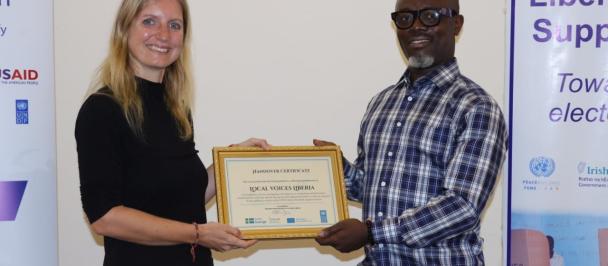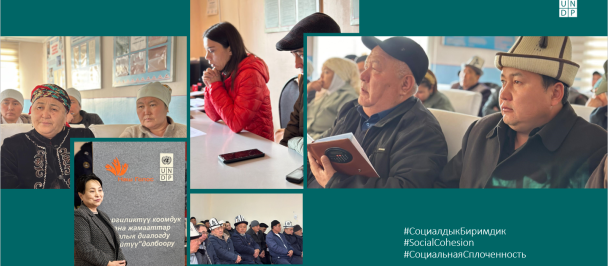National Action Plan on the UN Guiding Principles on Business and Human Rights implementation
February 8, 2023

Business and human rights is about businesses make money without violating human rights. Human rights are the rights and freedoms that every person has from birth, by virtue of his dignity. These are legal norms enshrined by international standards - the Universal Declaration of Human Rights and the UN documents adopted on its basis: the International Covenant on Economic, Social and Cultural Rights and the International Covenant on Civil and Political Rights. Human rights are what a person needs to live with dignity. There are things that should never be done to a person, and there are things that should always be done.
In 2011, the UN Guiding Principles on Business and Human Rights were adopted by the global community - this is the standard of expected behavior from business today.
It is very acute issue of nowadays since there is no clear definition from the state of game rules on its territory. As a result, not only the business sector, consumers, but also the state itself suffer, and it leads to inability to properly export its products to the world market.
Governments should not assume that businesses always prefer or take advantage of inaction, but should consider adopting a rational set of measures – national and international, mandatory and voluntary – that promotes respect for human rights by businesses. For the practical implementation of the Guiding Principles and considering each country’s national characteristics, it is necessary to start developing national action plans (NAPs).
So far, 31 countries have officially published NAPs on Business and Human Rights or included a dedicated chapter on business and human rights in their NAPs on human rights. This document gives a clear vision and expectations from entrepreneurs on the part of the state in the implementation of norms and obligations to respect human rights.
What is a NAP and why is it needed?
It is a political document where the state formulates the priorities and actions that it will take to fulfill international, regional and national obligations in relation to the designated topic.
NAPs on Guiding Principles on Business and Human Rights (UNGPs on BHR) help governments to formulate expectations from companies in the field of human rights, and companies to obtain government support in this area, reduce the risks of conflict situations in the field of human rights. NAPs also make it possible to more actively promote the topic of human rights in the business environment, not only in the country where such a plan is adopted, but also beyond its borders.
The preparation of NAPs in different countries provides an opportunity for participants in the process to exchange experiences, adopt best practices that help prevent human rights violations in the process of doing business.
NAPs can be a means for the States to improve coordination among various government departments relevant to the implementation of the Guiding Principles, as well as facilitate national discussion among various stakeholders. NAPs can also be flexible but structured tools for developing national policies and regulations, ensuring transparency and reviewing progress.
For example, the UN Working Group (UNWG) on Business and Human Rights has recommended that States develop such plans. The European Commission has invited all member States of the European Union to develop national action plans, and the Council of Europe has called on its members to do the same.
The underlying principle is that states must fulfill their international human rights obligations by taking the necessary steps to ensure that corporate human rights abuses are effectively prevented, investigated and punished.
What needs to be done by Kyrgyzstan to prepare and implement the NAP on human rights based on soft law?
It is necessary to start with a comprehensive assessment of the legal framework existing in Kyrgyzstan and compare it with the UNGPs, and expert review before developing NAP on human rights.
The NAP should clearly state which government body is responsible for its implementation, as well as for fulfilling specific obligations under the NAP. It should also provide intergovernmental participation in development and deployment, establish dedicated monitoring and reporting mechanisms, or, alternatively, integrate NAP into existing ones, if applicable. A clear allocation of responsibility for fulfilling NAP commitments is important, as without it, stakeholders will not be able to interact with the Cabinet of Ministers and demand accountability from it. On the other hand, Cabinet reports on the NAP and its impact are critical to the ongoing process of learning and improving business and human rights issues and how to address them.
State bodies, together with business associations, the Office of the Ombudsman, trade union, NGOs and rights holders, should create an open working group that will be accountable to society, where everyone can make their proposals to improve the legal framework in the business environment.
What has changed in countries that have already implemented the NAP on human rights in business?
By 2023, 31 states have already published NAPs. The first country was the United Kingdom in 2013, in 2016 they made amendments. Nineteen States are in the process of developing and six are already taking steps to develop NAPs. Among Commonwealth countries it is Kazakhstan and Azerbaijan are already in the process of developing NAPs. Georgia has included a chapter on business and human rights in its National Human Rights Action Plan.
NAPs have a number of potential advantages. Its development can lead to commitment by governments to implement business and human rights standards, which ensures better “vertical” alignment of national laws, policies and institutional practices with international obligations, strengthening the rule of law and, ultimately, improving the effectiveness of human rights.
What methodological materials can be used to develop the NAP in Kyrgyzstan?
In June 2014, the International Corporate Accountability Roundtable (ICAR) and the Danish Institute for Human Rights (DIHR) published a report containing recommendations for governments to encourage companies to act responsibly in human rights. The provisions of the report can be used in the development, implementation and revision of the NAP in the field of entrepreneurship and human rights. It proposes a methodology for assessing government implementation of the UN Guiding Principles (UNG), as well as a methodology for developing and evaluating the NAP itself.
To assist in the development of NAPs a special Guide prepared by the United Nations Working Group on Human Rights and Transnational Corporations and Other Business Enterprises has been published. It is addressed to all stakeholders involved in the NAP development process.
This article is element of a wide-ranging public information campaign to promote human rights issues in aspects of business practice in Kyrgyzstan within UNDP project Business and Human Rights (B+HR) funded by the government of Japan.
***
The United Nations Development Programme (UNDP) is one of the leading development organizations in Kyrgyzstan. Since 1993, we have been working in various areas, including inclusive development, environmental protection, crisis response, gender equality promotion, and collaborative efforts towards sustainable development goals.
For more information, please visit our website: www.undp.org/ru/kyrgyzstan or follow us on social media @undpkg.
Media Contact: Nurzhan Alymkanova, Communications Specialist, UNDP Nurzhan.alymkanova@undp.org

 Locations
Locations



